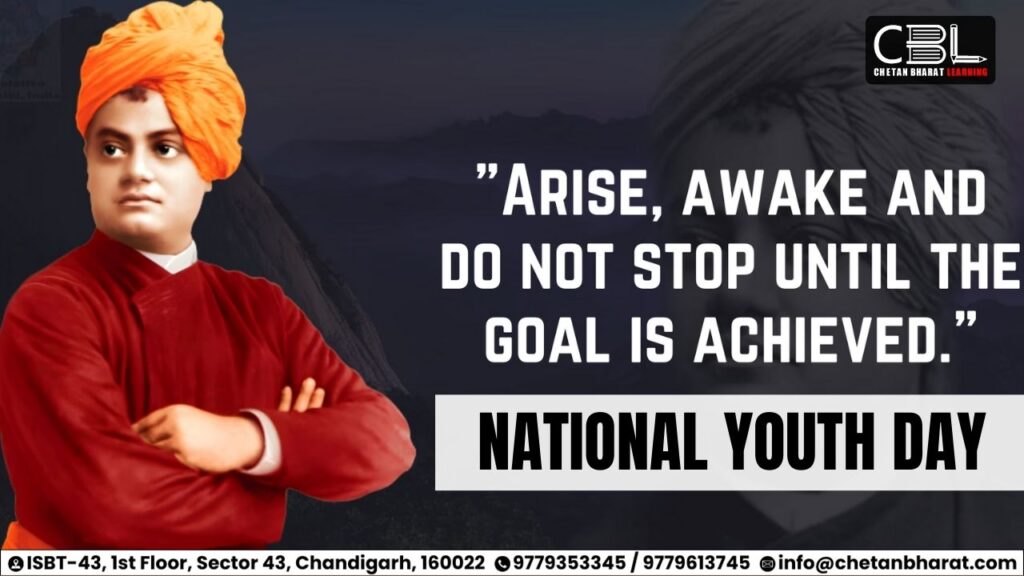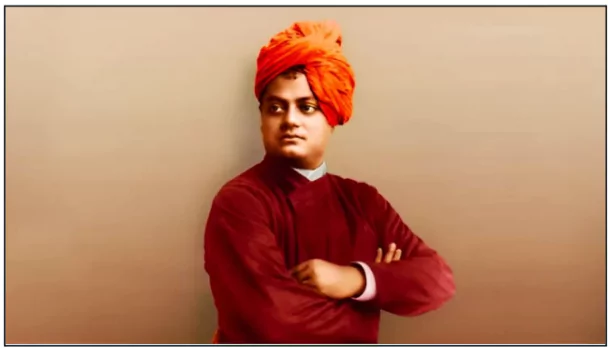
Important for UPSC, State PCS
Prelims: National Youth Day . National Youth Policy (NYP-2024)
Mains: General Studies Paper 2 & 4 – Youth Empowerment & Social Justice . Role of Youth in Democracy . Ethical Philosophy & Values of Swami Vivekananda . Character Building & National Development .
Context-
National Youth Day is observed in India every year on January 12 to honour the ideals of Swami Vivekananda who was born on January 12, 1863, in Kolkata.
- 12th of January 2025 marks the 162nd birth anniversary of Swami Vivekananda, and is celebrated as National Youth Day .
History of National Youth Day
- Declared by: Government of India in 1984.
- First Celebrated: January 12, 1985.
- Aim: To inspire India’s youth through Swamiji’s philosophies and teachings.
- Focus: Encouraging youth to embrace values like fearlessness, unity, spiritual growth, and service to humanity.
About Swami Vivekananda

- Initially his name was Narendra Nath Dutta, born on January 12, 1863, in Kolkata.
- Swami Vivekananda was the chief disciple of 19th century mystic and yogi Ramakrishna Paramhansa.
- He founded the Ramakrishna Math in 1897, a monastic order based on his guru’s teachings in Kolkata and a worldwide spiritual movement known as the Ramakrishna Mission based on the ancient Hindu philosophy of Vedanta.
- Swami Vivekananda is considered one of the great Indian monks who enlightened the Western world about Hinduism.
- As a disciple of Sri Ramakrishna Paramahansa, he pushed for national integration in colonial India and is credited with reviving Hinduism in the nation.
Swami Vivekananda’s Early Life and Spiritual Awakening
- Showed an early interest in Western philosophy, history, religion, and spirituality. Swami Vivekananda was Well-read in various subjects and meditated in front of Hindu deities’ images.
- Met Ramakrishna Paramhansa, who became his Guru, and remained devoted to him until Ramakrishna’s death in 1886.
- Adopted the name ‘Vivekananda’ in 1893 at the request of Maharaja Ajit Singh of the Khetri State, changing from his previous name ‘Sachidananda.’
- Literary Works: Wrote books like Raja Yoga, Jnana Yoga, and Karma Yoga.
- Death: Passed away on July 4, 1902.
Contributions Of Swami Vivekananda
Swami Vivekananda’s achievements left a lasting impact on society. He worked tirelessly to improve humanity, promote spiritual enlightenment, and cultivate harmony, social justice, and interfaith understanding.
- Introduction of Indian Philosophies: Swami Vivekananda played a crucial role in introducing the world to Indian philosophies, particularly Vedanta and Yoga.
- He preached a philosophy called “neo-Vedanta,” which provided an interpretation of Hinduism through a Western lens.
- Vivekananda believed in the harmony between spirituality and material progress.
- Emphasis on Education: Swami Vivekananda laid significant emphasis on education as a means of regenerating India.
- He advocated for a holistic and character-building education system that aimed at shaping individuals to become self-reliant and morally upright.
- World Parliament of Religions: Swami Vivekananda gained global recognition for his remarkable speech at the World Parliament of Religions in Chicago in 1893.
- He introduced Hinduism to America and called for religious tolerance and an end to fanaticism at the Parliament.
- His address highlighted the universality of religions, emphasizing the need for religious tolerance, harmony, and the unity of humanity.
- Pathways to Liberation: In his books, Swami Vivekananda expounded on the four paths to attaining liberation (moksha) from worldly attachments and pleasures:
- Raja Yoga, Karma Yoga, Jnana Yoga, and Bhakti Yoga.
- He provided practical insights into these paths to guide individuals on their spiritual journeys.
- Influence on Modern India: Swami Vivekananda’s ideas and teachings deeply influenced modern India.
- Netaji Subhas Chandra Bose referred to him as the “maker of modern India.”
- Vivekananda’s emphasis on self-confidence, national pride, and spirituality instilled a sense of purpose and revitalized the nation.
Associated Organizations of Swami Vivekananda
- Ramakrishna Mission: As the chief disciple of Ramakrishna Paramahansa, Swami Vivekananda established the Ramakrishna Mission in 1897.
- This organization focuses on value-based education, cultural preservation, healthcare, women’s empowerment, youth and tribal welfare, and relief and rehabilitation efforts.
- Belur Math: In 1899, Swami Vivekananda established Belur Math as his permanent abode.
- Belur Math serves as the headquarters of Ramakrishna Math and Ramakrishna Mission, providing a spiritual sanctuary and a hub for disseminating Vivekananda’s teachings.
- Advaita Ashrama: Swami Vivekananda founded the Advaita Ashrama in Mayavati, Uttarakhand, to encourage the study and practice of Advaita Vedanta philosophy.
- The ashrama concentrates on book printing and distribution, spiritual retreats, and educational and healthcare initiatives.
- Vedanta Society: Swami Vivekananda inspired the establishment of Vedanta Societies in the United States and other regions of the world.
- These organizations endeavor to improve their understanding of Vedanta philosophy and to provide a forum for spiritual seekers to investigate its teachings.
- Bharat Sevashram Sangha: Swami Vivekananda encouraged the formation of the Bharat Sevashram Sangha, despite the fact that it was not created by him.
- This group places an emphasis on altruistic service to humanity, addressing societal issues through educational, medical, and relief efforts.
CBL Practice Questions for Prelims
. Which of the following statements about Swami Vivekananda are correct?
- Swami Vivekananda delivered his famous speech at the World Parliament of Religions in Chicago in 1893.
- He was a proponent of the idea of social reform through the revival of traditional Indian values.
- Swami Vivekananda’s birth anniversary is celebrated as National Youth Day in India.
Select the correct answer using the code below:
A) 1 and 2 only
B) 2 and 3 only
C) 1 and 3 only
D) 1, 2, and 3
Answer: D) 1, 2, and 3
CBL Mains Practice Question
Swami Vivekananda emphasized that the youth of India are the future of the nation, and their empowerment is key to India’s progress. In this context, analyze the relevance of his philosophy for youth empowerment and nation-building in contemporary India.




Leave a Reply
You must be logged in to post a comment.